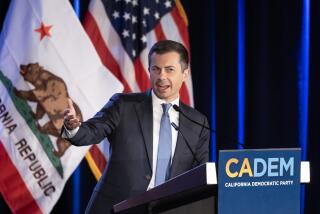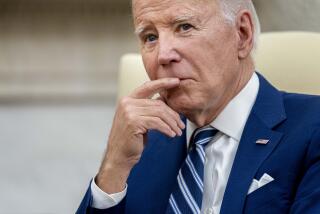Dukakis, Stumping South to West, Makes Ample Use of Reagan Record
Appealing to conservative white “Reagan Democrats” in the South and then to environment-minded voters in the West, Democratic presidential nominee Michael S. Dukakis on Thursday saw the extremes of America.
Beginning the day in Mississippi, he spoke to an audience heavy with Republican banners and sprinkled with white supremacists and anti-abortion hecklers.
Then he flew to Los Angeles for an environmental policy speech at UCLA before an adoring audience and with a question period complete with representatives of such groups as Beyond War and the Tree People.
Second Trip in Two Weeks
The trip was Dukakis’ second to California in two weeks and his fourth since winning the state’s primary in June. A fifth visit is planned for the end of the month. Dukakis will travel today to Laguna Beach and then to Seattle and Denver for a series of events aimed at highlighting Western and environmental issues.
The schedule underscored his campaign’s determination to make a race in the state, where Democrats in the recent past often have made at best a symbolic effort.
Appearing relaxed and confident, Dukakis joked with the UCLA audience and delivered popular answers to sympathetic questions. He pledged to end American support for the rebels in Nicaragua, to restore federal aid for low-income housing and to make a priority of energy conservation measures.
In his speech, he received warm applause with promises to halt new oil-lease sales off the California coast, to “end forever any plans to drill in Santa Monica Bay” and to support park legislation for the California desert.
‘Really a Fool’s Choice’
“We don’t have to make the false choice--it’s really a fool’s choice--between economic growth or environmental quality,” he said. “We can have both. And, in fact, we must have both.”
And he attacked the Reagan Administration’s record on environmental issues, telling the audience crowded into UCLA’s Royce Hall and hundreds more gathered outside listening on loudspeakers that “we’ve been taking our environment for granted. And we’re beginning to pay the price.”
By contrast, in his speech at the Neshoba County fair in Philadelphia, Miss., Dukakis steered carefully away from criticism of Reagan, choosing instead to steal some pages from the Gipper’s playbook.
Eight years ago, Reagan kicked off his White House drive before a huge audience at the same fair.
Dukakis’ appearance drew some sharp contrasts with Reagan’s triumphal address. Thursday’s crowd, like the one in 1980, was overwhelmingly white. But Dukakis traveled to the event on a bus with some of the Rev. Jesse Jackson’s leading supporters and stood on the stage with black Democratic elected officials and party leaders, most of whom were attending the formerly segregated fair for the first time.
Mentions Civil Rights
And where Reagan had used the event to declare “I believe in states’ rights,” Dukakis proclaimed support for civil rights. But his mention of civil rights was but one brief line in the middle of a 20-minute speech.
And while he worked into the address a reference to Boston Red Sox pitcher Dennis (Oil Can) Boyd, who was born an hour away in Meridian, Miss., he failed to mention the names of three civil rights workers, two Jews and a black, whose murder here in 1964 outraged the nation.
Thursday was the 24th anniversary of the day their bodies were discovered, nine miles from where Dukakis spoke.
His only reference to the anniversary was an oblique one, telling the crowd that “especially today, I say to all Americans . . . let us work together.”
Philadelphia and its fair long have been sites visited by aspiring politicians. But it was the 1964 murder that forced the town into national consciousness.
The three, Andrew Goodman, 20, Michael H. Schwerner, 24, and James E. Chaney, 20, were arrested by local police, then released and sent on their way. A little while later, men wearing Ku Klux Klan robes, including one of the deputy sheriffs who had arrested the three, caught them on a back road and shot them. Their bodies were found only after a 44-day search.
No Explicit Reference
Dukakis aides had debated having him make an explicit reference to the murders, but he chose not to.
Overall, the chief impression of the speech was once again to demonstrate how Dukakis has tried to expropriate the winning themes of patriotism and national strength that Republicans once thought they had a copyright on.
Opening the speech, for example, Dukakis used one of Reagan’s most successful staples from the 1984 campaign--the Olympics.
“In this Olympic year,” he told the crowd, “our best athletes will be going to Seoul next month to do their best. And just as they’re working hard to be number one in Seoul, we’re going to be number one around the world.”
The day’s events clearly illustrated the varied political realities Dukakis faces in his quest to amass an electoral vote majority in November.
In California, Dukakis strategists see a relatively clear path: hammer at the Administration’s unpopular environmental record; build an effective grass-roots get-out-the-vote organization; win a large vote from the state’s minority communities, particularly Latinos, and prevent Vice President George Bush from rolling up large margins in more conservative areas, such as Orange County and the Central Valley.
Tougher Job in South
In the South, by contrast, the path is far more complex. Dukakis has hopes of breaking the Republican grip on the region, but to do so, he must appeal both to blacks, who make up more than a quarter of the electorate in Mississippi, and to the sort of conservative whites who attend the Neshoba fair.
In statewide races over the last six years in Mississippi and elsewhere in the former Confederacy, Democrats have proved that such coalitions can be built.
On the flight out of Mississippi toward California, Dukakis was asked how he would try to build that coalition.
Economic development and jobs, he said, was the “fundamental issue” that voters of both races care about. But judging by his reception in the South on Thursday, Dukakis still has a long way to go.
A good third of the crowd were waving signs for GOP Senate nominee Trent Lott and a few sported buttons for Bush.
When Norman Johnson, the president of the fair, introduced Dukakis, he referred to him as “the presidential nominee of the national Democratic Party,” a meaningful phrase here, where the Mississippi Democratic Party often has opposed national nominees.
And as Dukakis spoke, anti-abortion pickets heckled, while a group called the Nationalist Movement circulated pamphlets promoting “Christianity as the consummate religion (and) . . . the White Race as the supreme civilizer.”
“Real Democrats have red necks, white skins and blue collars,” read one sign in the crowd.
“Neshoba County is Bush Country,” proclaimed one. “For our local people, we vote Democrat, but nationally we vote Republican,” said Margaret Fowler, wearing a Bush button, an anti-abortion sticker and carrying a Trent Lott placard.
‘Going to Be Closer’
“It’s going to be closer this year,” she predicted, “but still Republican.”
“This is a fairly good Dukakis showing for this part of the state,” said Malcolm White of Jackson, a Dukakis supporter, as he surveyed the crowd. “This is still a pretty Republican area.”
The other half of the coalition Dukakis would need in the South is black. Mississippi is the only state with a black Democratic party chairman, Ed Cole. He got tepid applause when introduced prior to Dukakis’ speech.
The state is also one of three so far in which Dukakis has named blacks to run his campaign, Vermont and Massachusetts being the other two. But the Mississippi chairman, Mike Marshall, was not introduced to the fairground crowd. Instead, Dukakis was accompanied by his state coordinator, who is white.
More to Read
Get the L.A. Times Politics newsletter
Deeply reported insights into legislation, politics and policy from Sacramento, Washington and beyond. In your inbox three times per week.
You may occasionally receive promotional content from the Los Angeles Times.











